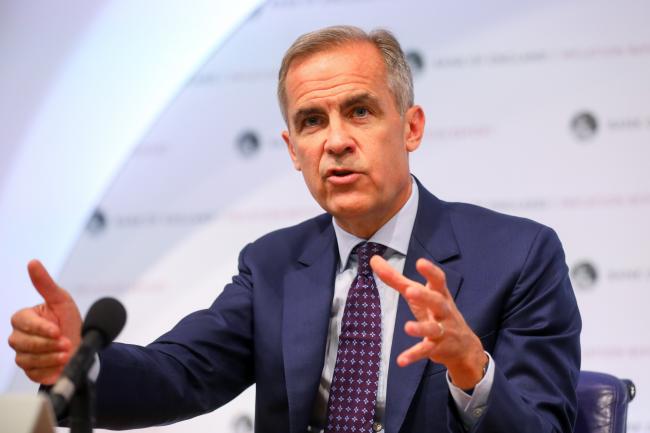(Bloomberg) -- Bank of England Governor Mark Carney told senior government ministers that a no-deal Brexit would probably see interest rates rise rather than fall, according to people familiar with the matter.
Carney, who joined a cabinet meeting Thursday to outline the BOE’s planning for a turbulent exit from the European Union, told those present that crashing out without an agreement would lead to a fall in the pound and higher tariffs, pushing inflation higher. That would make it harder to cut borrowing costs to support the economy as the BOE did in the aftermath of the Brexit vote in 2016, said the people, who who asked not to be named because the discussions were private.
A spokesman for the BOE didn’t immediately respond to requests for comment when contacted out of office hours.
Central bank policy makers, who cut rates to a record-low 0.25 percent in August 2016, have increased borrowing costs twice in the past year to keep inflation in check. Officials have previously said that Brexit could prompt a policy move in either direction.
Carney also said said a no-deal outcome could see house prices fall by over 35 percent, while mortgage rates increase. The BOE has previously said that its stress tests show banks could withstand the worst-case scenario.
2008 Comparison
The Times earlier reported details of the meeting, while the Guardian reported that Carney warned that a no-deal Brexit could be as catastrophic for the U.K. economy as the 2008 financial crisis. The BOE declined to comment on both of those reports.
Chancellor Philip Hammond announced this week that Carney will stay on an extra seven months to ensure continuity during the transition out of the the EU after the U.K. formally exits in March 2019.
Carney’s role in the Brexit debate stirs controversy. While some saw him a pillar of stability in the aftermath of the referendum, euroskeptics have criticized him for wading too far into the political debate with overly-gloomy predictions. Jacob Rees-Mogg, a Brexit purist, called him the “high priest of project fear.”
Carney’s high-impact appearance came as the BOE’s Monetary Policy Committee voted unanimously Thursday to hold interest rates unchanged at 0.75 percent after hiking at the last gathering in early August. They reiterated that Brexit was the biggest challenge to the outlook and that uncertainty about the U.K.’s future outside the EU had risen.
